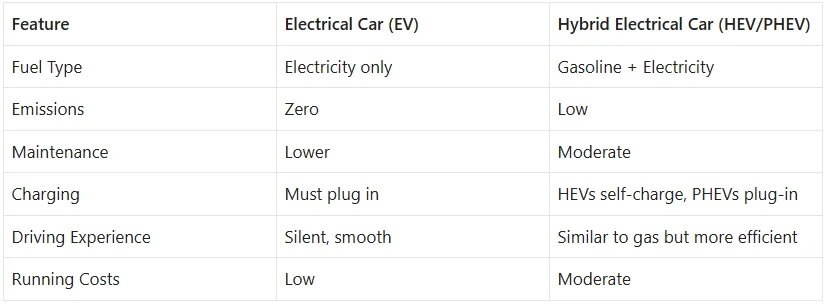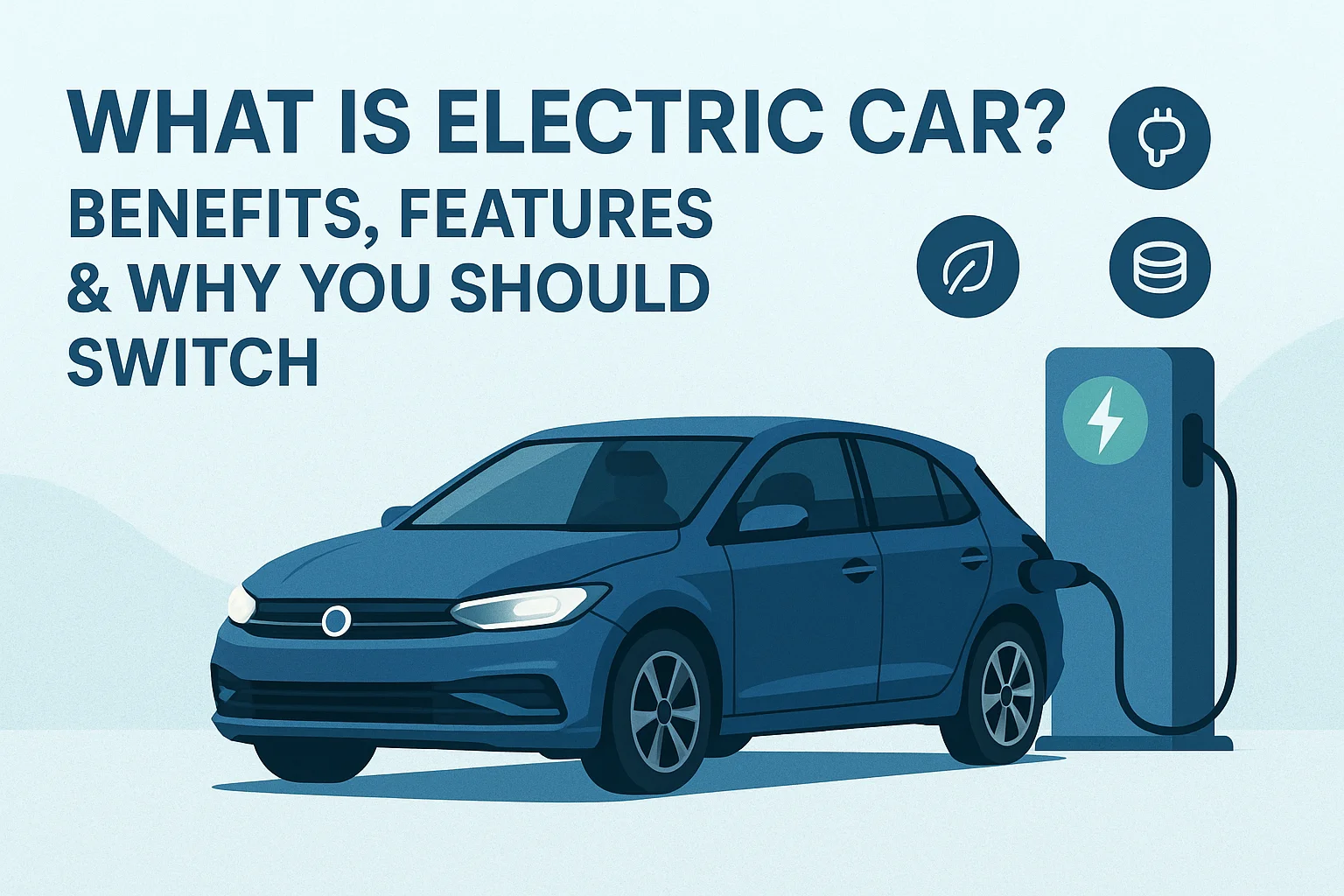Electrical cars also known as electric cars are revolutionizing the automotive industry. These cars are run on electricity that has been stored in rechargeable batteries as opposed to using gasoline or diesel. Electric cars are not another fashion, but the reaction to the increasing concern over the ecological situation, fuel prices, and the efficiency of vehicles over the long run. However, what is an electrical car? And what are their speed, reliability and cost positions? We will discuss everything you should know in simple easy to understand language.
How Electrical Cars Work?
A lithium-ion battery supplies an electrical car with power to an electric motor. Once you put the car in a charging station, it will be charged with energy that drives the motor and the wheels. No engine sounds, no exhaust gas, no visits to the gas station. Sounds futuristic? It’s already here.
Most of the contemporary electric vehicles are fitted with such advanced functions as regressive braking, which contributes to battery recharge during deceleration, and touchscreen navigation systems that control all of the functions, including navigation and climate control.
Features of Electrical Cars
To become more specific about what is so attractive about electrical cars, we will examine them a little further:
- Electric Motor- This will give the motor instant torque to accelerate smoothly and quickly.
- Rechargeable Battery Pack– The vehicle is powered by this and can be charged via home or public chargers.
- Regenerative Braking –Uses energy when braking and it is passed to the battery
- Infotainment Systems- The new EVs have big digital screens that are connected, have applications, and intelligent controls.
- Autopilot and Driving Assistance – They exist in expensive EVs such as Tesla, which have semi-autonomous driving features.
- Climate Control- Highly efficient systems that do not use engine heat as in the traditional cars.
Benefits of Driving an Electrical Car
The transition to an electric vehicle is associated with some unbelievable benefits:
- Reduction in Running Costs: Electricity is less expensive than gasoline. And no oil changes or no exhaust repairs.
- Eco-Friendly: Zero tailpipes emissions imply that you are doing the planet a favor each time you get behind the wheel.
- Lesser Vibration: Electric motors are vibration free and quiet.
- Rebates, Tax credits, other incentives: In many countries, there are rebates, tax credits or any other incentives to buy electric.
- Reduced Maintenance: Few moving parts will result in reduced things that can go wrong.
- Instant Power: EVs are unexpectedly fast due to the instant flow of torque that electric motors offer.
What Is the Fastest Electrical Car in the World?
Electric cars will not fail you in case you are the fan of speed. The fastest electrical car in the world is the current owner of the title Rimac Nevera. It is a Croatian supercar with the ability to reach an outrageous 258 mph (415 km/h). Better still, it can accelerate to 60 mph in 1.85 seconds only.
It is not only about speed, as well. The Rimac Nevera also has:
- 1,914 horsepower
- Each wheel has four single electric motors.
- High-tech aerodynamics and performance adjustment.
- It was a distance of 340 miles, and everything that power.
Selling at approximately 2.1 million, it is a definite demonstration of what could be done in the EV market.
What Is the Most Reliable Electrical Car?
Reliability is the priority when purchasing an EV. The Tesla Model 3 is shine in that regard. It is always ranked among the most reliable and credible electric cars available.
What makes it reliable?
- Excellent battery life with limited depreciation as time goes by.
- Software upgrades which can be done over-the-air, and enhance the car without going to the dealership.
- Strong Supercharger system, which makes the long journeys simple.
- Good construction, particularly of the new models.
The Hyundai Ioniq 5, Chevrolet Bolt EV and Toyota bZ4X are other very trusted electric cars. Both of them have good performance, excellent warranties, and low maintenance costs.
What Is a Hybrid Electrical Car?
A hybrid electric vehicle combines a conventional gasoline-powered engine and electric motor. It is intended to merge the efficiency of electricity and the range of gas which is long.
There are two main types:
HEV (Hybrid Electric Vehicle) – Automatically charges the battery either via the engine or via the regenerative braking (e.g.: Toyota Prius).
PHEV (Plug-in Hybrid Electric Vehicle) -Uses a charger and is typically provided with a greater electric-only range (e.g., Mitsubishi Outlander PHEV).
These hybrids are ideal to those drivers who are not yet willing to be fully electric but wish to cut down on fuel use and emissions.
What Is the Difference Between Hybrid and Electrical Cars?
Hybrids and fully electric cars are not the same though they sound like they are.
The hybrid cars are powered by an electric motor and a gasoline engine and therefore you still have to fill up at the gas station. They are still less efficient in terms of fuel consumption than conventional cars but not as clean and cost-effective as fully electric cars.
Electrical cars, on the other hand, can use electricity only. They can be plugged in to be charged, and they do not use any gasoline at all- zero emissions, less expensive and a more comfortable ride.
Here’s a quick breakdown:

What Is the Most Expensive Electrical Car?
Lotus Evija is a car that may attract your attention in case you want something exclusive and luxurious. Being one of the most costly electrical vehicle in the world, it retails at a price of 2.8 million dollars.
This is what makes it worth the extravagance:
- Almost 2,000 horsepower
- Top speed of over 200 mph
- Complete electric functionality and amazing design.
- Custom-made by hand-craftsman – just 130 were made.
It is a car that is designed to serve the billionaires and collectors, however, this is also the future of the high-performance electric driving.
Why Electrical Cars Are the Future?
It is entering the age where automobiles do not require gasoline to give them amazing performance. There is a vehicle that fits any person because you want the quickest electrically powered vehicle, the safest, or even a hybrid that will fit between these two worlds.
Key takeaways:
- Cars that use electricity are fully charged by battery.
- The highest speed EV is Rimac Nevera (258 mph).
- Tesla Model 3 is the best among the EVs.
- Hybrid cars consume gas and electricity.
- The most expensive electric car is the Lotus Evija, and it costs 2.8 million dollars.
- It has advantages such as reduced emissions, reduced running costs and reduced rides.
The future is electric, and it’s already on the road.
Are electric cars less costly to operate as compared to gas cars?
Yes! The price of electricity is lower than that of gasoline, and EVs need fewer repairs.
Is it possible to charge an electric car at home?
Absolutely. The majority of EV owners install a Level 2 home charger to charge faster.
How long does it take to charge an EV?
It depends on the charger. It takes about 4-8 hours to be charged on a Level 2 charger; DC fast chargers can charge within under an hour.
Are electric cars suitable in the cold climate?
There is a slight decrease in performance, and most EVs have cold-weather capabilities such as battery heaters.
How long do EV batteries last?
The electric car batteries are expected to last between 8 and 15 years and most manufacturers provide long time warranties to these batteries.
Conclusion
It is high time to change to an electric or hybrid vehicle. Its enhanced infrastructure, quicker charge, and more varied features than ever make it not just another vehicle you are purchasing, but an investment in the future. Electric vehicles are the right choice, be it in terms of performance, the planet or your wallet.

